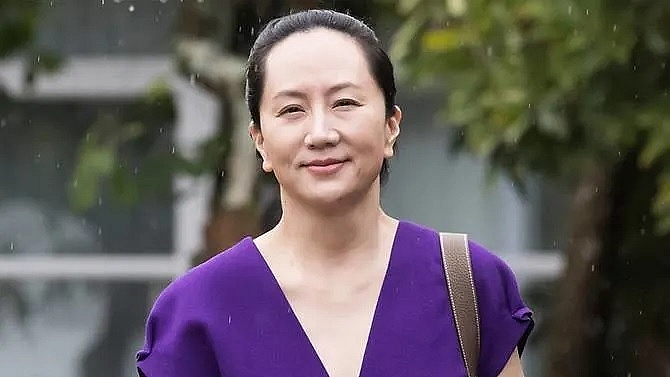Huawei executive in Canada court, bids to quash extradition
 |
| Huawei chief financial officer Meng Wanzhou, who is out on bail and remains under partial house arrest after she was detained last year at the behest of American authorities, leaves her home to attend a court hearing in Vancouver. (photo source: Darryl Dyck/The Canadian Press via AP) |
The 47-year-old Huawei chief financial officer was detained during a stopover at the Vancouver airport last December on a US warrant.
The arrest of Meng - a rising star whose father Ren Zhengfei founded Huawei and over three decades grew it into a global telecom giant - caused an unprecedented diplomatic rift between Canada and China.
The United States wants to put Meng on trial for fraud for allegedly violating Iran sanctions and lying about it to US banks - accusations her lawyers dispute.
In a preliminary disclosure hearing at the British Columbia Supreme Court, her lawyers will ask for details from prosecutors about her arrest after her flight landed from Hong Kong.
They are expected to also seek the release of documents in a separate civil proceeding this week against federal police and border officials, in which they allege false imprisonment and other rights breaches.
The defense claims that the Canada Border Services Agency (CBSA) and Royal Canadian Mounted Police (RCMP) delayed her arrest and collected evidence for American authorities.
Both the CBSA and RCMP have denied any wrongdoing.
Evidence from both hearings could be used to argue a violation of process and, if successful, put pressure on the attorney general to reconsider a decision to proceed with the extradition.
Nine days after her arrest, Beijing detained two Canadians - former diplomat Michael Kovrig and businessman Michael Spavor - accusing them of espionage in a move widely viewed as retaliation.
China has also blocked billions worth of Canadian agricultural shipments, while Canada has rallied the support of allies including Britain, France, Germany and the US, as well as the EU, NATO and the G7.
EVIDENCE COLLECTION
Meng's lawyers have said in court documents that border agents detained her under the pretense of an immigration matter and never alerted her to a US warrant for her arrest, while using passwords she volunteered to snoop through her computers and phones.
They questioned her for three hours without advising her of her rights, they said, before eventually handing her over to federal police.
"From the outset of the applicant's detention," the RCMP and border agents were acting on behalf of "the FBI for the purpose of obtaining and preserving evidence," Meng's lawyers have said.
"The question that remains is to what extent and how the FBI were involved in this scheme."
The Crown has already disclosed some material, but the defense insists it was insufficient and says the 1,742 pages were heavily redacted.
The defense, arguing that the case is politically-motivated, has also pounced on US President Donald Trump's remarks that he might seek to have the charges against Meng dropped in exchange for trade concessions from China.
The world's two biggest economies, the US and China, are scheduled to resume trade talks next month.
Canada has insisted that it was following the rule of law in Meng's case, while calling the arrest of its two nationals arbitrary.
It sacked its ambassador to China in January for suggesting that Meng had a "strong case" against extradition, citing Trump's remarks.
China's envoy, meanwhile, has moved onto another posting in Paris, leaving both sides without top diplomatic representation for several months.
Both sides nominated replacements in August - in a sign they may be ready to talk. China, however, stressed that relations would not be normalized until Meng is released.
Meng is currently out on bail, awaiting the start of her extradition hearing in January.
What the stars mean:
★ Poor ★ ★ Promising ★★★ Good ★★★★ Very good ★★★★★ Exceptional
Related Contents
Latest News
More News
- State corporations poised to drive 2026 growth (February 03, 2026 | 13:58)
- Why high-tech talent will define Vietnam’s growth (February 02, 2026 | 10:47)
- FMCG resilience amid varying storms (February 02, 2026 | 10:00)
- Customs reforms strengthen business confidence, support trade growth (February 01, 2026 | 08:20)
- Vietnam and US to launch sixth trade negotiation round (January 30, 2026 | 15:19)
- Digital publishing emerges as key growth driver in Vietnam (January 30, 2026 | 10:59)
- EVN signs key contract for Tri An hydropower expansion (January 30, 2026 | 10:57)
- Vietnam to lead trade growth in ASEAN (January 29, 2026 | 15:08)
- Carlsberg Vietnam delivers Lunar New Year support in central region (January 28, 2026 | 17:19)
- TikTok penalised $35,000 in Vietnam for consumer protection violations (January 28, 2026 | 17:15)

 Tag:
Tag:




















 Mobile Version
Mobile Version